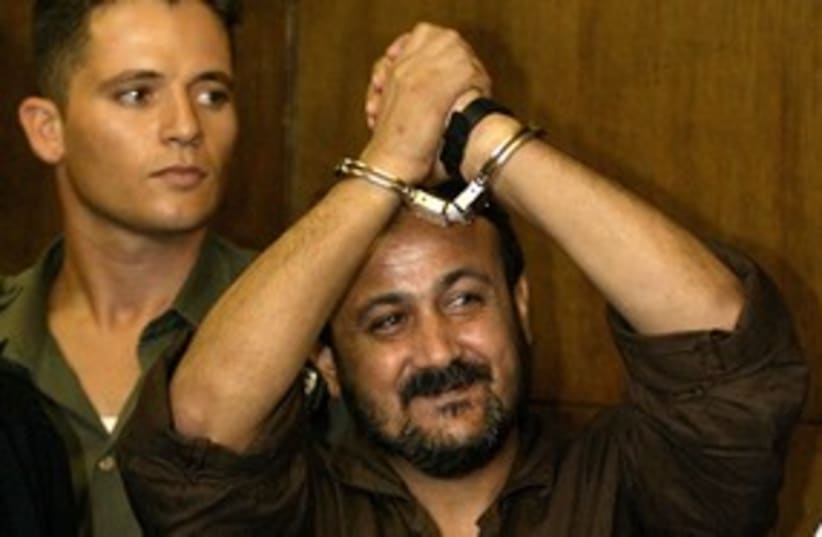“The Palestinian leadership is prepared to make compromises.”Peretz, a front-runner in the current race for Labor Party leadership, sees Barghouti as an important Palestinian ally due to his popularity in the West Bank and Gaza.Barghouti, who is thought to be the mastermind behind the second intifada, has been in prison since 2002, and is often mentioned in possible prisoner-exchange deals between Palestinians and Israel. He is seen as a possible successor for Palestinian Authority President Mahmoud Abbas.“Netanyahu says there’s ‘no partner’ – that’s just an avoidance tactic. Here is a partner,” Peretz said, in reference to Barghouti.“Since the Palestinians agree to territorial swaps, there is no reason that we can’t agree to begin negotiations based on 1967 borders,” Peretz added. “We’re going to decide which territory to swap, so why not talk?” “Now, the power is in our hands,” the Labor MK said, adding that he and Barghouti think that “in a few more months, Netanyahu will miss the situation he’s in now.”Peretz pointed out that the regimes to come out of the Arab Spring may end up being less friendly to Israel.“When the new regimes stabilize, they will be more extreme. Israel can be a calming factor, or a provocation,” he cautioned.Peretz also warned that with the expected Palestinian declaration of statehood in the UN in September, “Israel’s status is going to be much weaker.”“The fact is, people are talking about Israel’s legitimacy and the occupation. The discussion itself is an accomplishment for the Palestinians,” he said. “An earthquake is coming.”Peretz, who recently recruited 23,232 new Labor members – more than any other candidate – said he does not think the visits will affect him politically.“I have always been in contact with Palestinian leaders,” he said. “I think it’s very important, and a key to finding a solution to conflicts in the Middle East.”“This has been part of my worldview for years,” Peretz added, saying that he called for a Palestinian state and negotiations with the PLO in the 1980s, when such talks were illegal.“An independent Palestinian state is in Israel’s best interest,” he added.Peretz also said that, in his opinion, Israeli-Arabs could be “a bridge between the Palestinians and Israel,” and help in the peace process.
Peretz admits to visiting Barghouti
Frontrunner in Labor leadership race says after meeting with jailed Palestinian leader: "PM is missing opportunity for peace, earthquake is coming."

“The Palestinian leadership is prepared to make compromises.”Peretz, a front-runner in the current race for Labor Party leadership, sees Barghouti as an important Palestinian ally due to his popularity in the West Bank and Gaza.Barghouti, who is thought to be the mastermind behind the second intifada, has been in prison since 2002, and is often mentioned in possible prisoner-exchange deals between Palestinians and Israel. He is seen as a possible successor for Palestinian Authority President Mahmoud Abbas.“Netanyahu says there’s ‘no partner’ – that’s just an avoidance tactic. Here is a partner,” Peretz said, in reference to Barghouti.“Since the Palestinians agree to territorial swaps, there is no reason that we can’t agree to begin negotiations based on 1967 borders,” Peretz added. “We’re going to decide which territory to swap, so why not talk?” “Now, the power is in our hands,” the Labor MK said, adding that he and Barghouti think that “in a few more months, Netanyahu will miss the situation he’s in now.”Peretz pointed out that the regimes to come out of the Arab Spring may end up being less friendly to Israel.“When the new regimes stabilize, they will be more extreme. Israel can be a calming factor, or a provocation,” he cautioned.Peretz also warned that with the expected Palestinian declaration of statehood in the UN in September, “Israel’s status is going to be much weaker.”“The fact is, people are talking about Israel’s legitimacy and the occupation. The discussion itself is an accomplishment for the Palestinians,” he said. “An earthquake is coming.”Peretz, who recently recruited 23,232 new Labor members – more than any other candidate – said he does not think the visits will affect him politically.“I have always been in contact with Palestinian leaders,” he said. “I think it’s very important, and a key to finding a solution to conflicts in the Middle East.”“This has been part of my worldview for years,” Peretz added, saying that he called for a Palestinian state and negotiations with the PLO in the 1980s, when such talks were illegal.“An independent Palestinian state is in Israel’s best interest,” he added.Peretz also said that, in his opinion, Israeli-Arabs could be “a bridge between the Palestinians and Israel,” and help in the peace process.